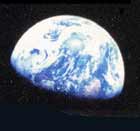|
Climate refugees
Climate change is added to, and interacts with, the factors making
it more difficult for people to support themselves in their homelands,
such as overpopulation and unemployment, water shortage, soil depletion,
deforestation, and the gross unfairness of the international trade
system.
Global heating causes
rising sea level, which causes people in Bangladesh and oceanic
islands to lose the land under their feet. Climate change brings
more droughts, heatwavesm floods, storms, sandstorms — which
kill people or drive them from their homes,
Climate change has
exacerbated shortages of water. An ethnic conflict such as the running
genocide in Darfur is underlain by struggle for water. Other quarrels
over water could lead to wars: for instance the countries higher
up the Nile are beginning to object to the large percentage of its
water they are obliged to pass down to Egypt; Israel wants to control
the water flowing into it from the Litani, Jordan, and Yarmuk, whose
headwaters are in Arab countries; Turkey possesses the headwaters
of the Tigris and Euphrates, builds dams on them, and rations the
amount it allows down into Iraq, whose civilization is a product
of those rivers.
Life for peasant
farmers trying to feed their families is an anxious struggle even
without stresses such as crop failures, debt, rising food prices,
gunmen hired by landlords or industrialists to evict them —
and the extra stresses caused by climate change.
An example of a
region from which people have already been forced out by climate
change is Mozambique. As yet they make their way mainly to nearby
countries, but these also are poor. In the future more of them will
be forced farther.
Pressure of refugees
from south of the Mediterranean has begun to cause quarrels between
countries of the European Union. Britain complained that the Red
Cross camp for asylum seekers at Sangatte (closed in 2002) facilitated
the passage of illegal immigrants across the Channel. Italy complained
that other European countries were not sharing the burden of refugees,
and in April 2011 it formally rebuked France for stopping at their
border a train carrying Tunisian refugees; then France, Belgium
and Germany warned that they might restore border controls —
in other words, go back on the Schengen agreementm one of the great
liberalizing advances made by the EU.
We like to divide
refugees into “political” or “religious,” on
the one hand, and those who are merely “economic.” But
the political violence in a region often derives from the extreme
poverty suffered by a large fraction of the people; the religious
extremism often derives from desperation. Refugees, starting from
a state of shock and destitution, and exploited by people-traffickers,
endure epic sufferings in their months of struggle to get through
Central America and Mexico to the U.S.A., or from Afghanistan or
Sudan to Europe. Very often the refuge they find is incomprehension,
imprisonment, joblessness, and hostility. In some host countries
with a tradition of tolerance, the xenophobic reaction is growing.
If the stream of refugees becomes multiplied, we can imagine a deepening
division of the world into countries afflicted with desertification
and other results of climate change, and countries that are still
relatively livable and that fortify their borders to keep the desperate
out. This would be a world with more terrorism, and less civilization.
return
|

